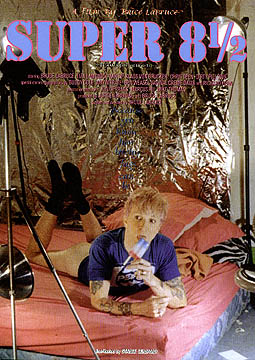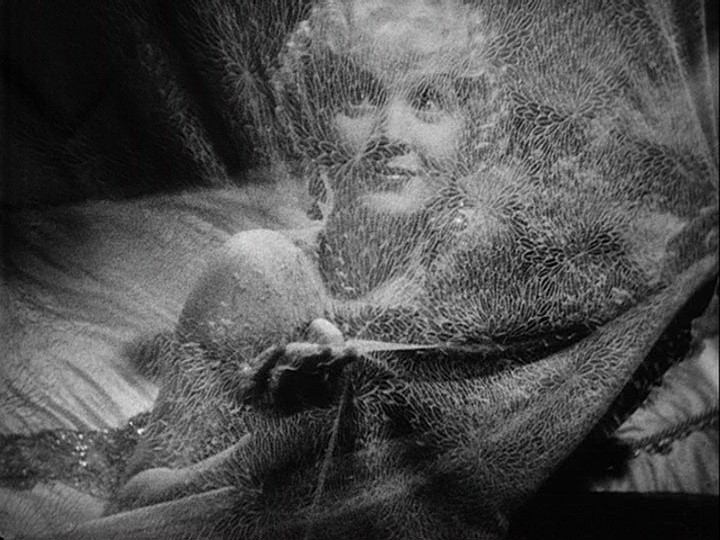
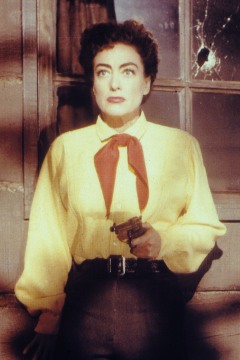
Yet another meander to the New Bev brought me to a film I cannot believe I have not seen. Last night, it was a double feature: Joan Crawford in Nicholas Ray's Johnny Guitar and Marlene Dietrich in Fritz Lang's Rancho Notorious, also known as Chuck-a-Luck (and for just reason). Good god! The friend with whom I always attend the New Bev screenings leaned over to me at one point during Johnny Guitar and said, "I don't know how we're going to get through the whole thing." You see, the writing in Johnny Guitar is so sensationally campy that we found ourselves laughing hysterically about every other minute. Yet, this is not the sort of camp that comes with poorly aged films. No, Johnny Guitar's camp is very self-evident. I mean, for god's sake, we've got Joan Crawford in drag as a Cowboy for half the film. When she's not donning the garb of the opposite sex, she's wearing a virginal white gown (which, of course, at one point catches on fire). Crawford, in pants, I might add, delivers lines like "Down there I sell whiskey and cards. All you can buy up these stairs is a bullet in the head. Now which do you want?" In an emotional moment with Johnny Guitar, who arrives at the ranch to seemingly just play guitar, yet all too soon reveals a more intricate past with Crawford's Vienna, the two share the exchange,
Johnny: How many men have you forgotten?
Vienna: As many women as you've remembered.
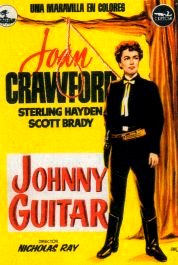
Yet the strangest turn of Johnny Guitar lies in Crawford's role as the "good guy." (And I do mean "guy.") My friend at a later point turned to me and asked "Do you think there's going to be a happy ending?" "No, she'll have to die because she's wearing pants," I said. And this is a true trope of Hollywood cinema. Typically, the figure who breaks narrative convention must suffer the consequences. Yet Johnny Guitar never takes this stance. Crawford is, bizarrely enough, the hero(ine?) from beginning to end. Of course, you want her to live, but you could never fathom that she would. She rides with the tough guys. She's Joan Crawford for Christ's sake! She cannot be pure! And though Vienna is not pure, the narrative lets her off the hook.

Sadly, Rancho Notorious abides by these conventions all too well. Though not thoroughly typical, narratively speaking, Dietrich's Altar Keane is a saloon singer (a real stretch for Dietrich) whose legend outweighs her person. In love with a fugitive, she opens a horse ranch where fugitives seek refuge. Vern, our protagonist, finds his way there in hopes of finding the man who raped and killed his fiance. While there, he falls for Keane, who sees in him what a good life might have been. So fittingly, she must pay for her actions.

Though the film does feature Dietrich in drag quite prominently, it cannot fully divorce itself from the
infamously feminized Dietrich which I discuss at some length here. This is not, however, Dietrich working with Von Sternberg, who used her best as a piece of costumery onto which he might project his wanted self-image. Lang's Dietrich comes off a little flat, and without Von Sternberg's fantastic use of visual stylization, we merely have the unbelievable Dietrich, swooning over the love of a man. The real highlight to the film is the remarkably hokey score penned by Ken Darby which punctuates various scenes of the film, explaining it is a story of "Violence! Murder! and Revenge!"

I know you want me to say the new DVD pick of the week is Walk The Line, which was released this morning, but that just wouldn't be like me, and since I don't think Reese has done much good since Freeway it shall certainly not take this position here. I have not seen the film, though I probably will once my Movie Rental punch card has been filled (therefore I will not have to pay for it). Come to think of it, it's been even longer since Juaqin has done anything good, but ahhhh... remember To Die For?

No, today's recommendation is a reserved one, stemming more from my desire to fantastically violate Kevin Bacon than from the merit of the actual film. The film in question is Atom Egoyan's most recent offering Where The Truth Lies. It's not great, but it's very pretty and Kevin Bacon is very creepy in that sexy Willem Dafoe sort of way. And he's naked a lot. But, if you're like me, and all you want to do is look at Kevin Bacon fucking, need I remind you of a little cinematic gem called Wild Things?

Joyeux Noel finally finds its theatrical release in the United States. But I mean really, couldn't they just sit on this one until vraiment noel? This film was ALL OVER France when I was there last November. It is supposed to be quite a good little film. Maybe after this Friday, you may find a review of it here.
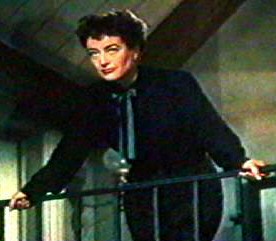
And because of my double feature last night, the already on DVD pick of the week is none other than Johnny Guitar which Amazon is listing as Out Of Print. Hopefully your local videostore stocked it before this travesty occurred. It might be your only chance to see Joan Crawford in drag... wait, what am I saying? She's always in some sort of drag.































